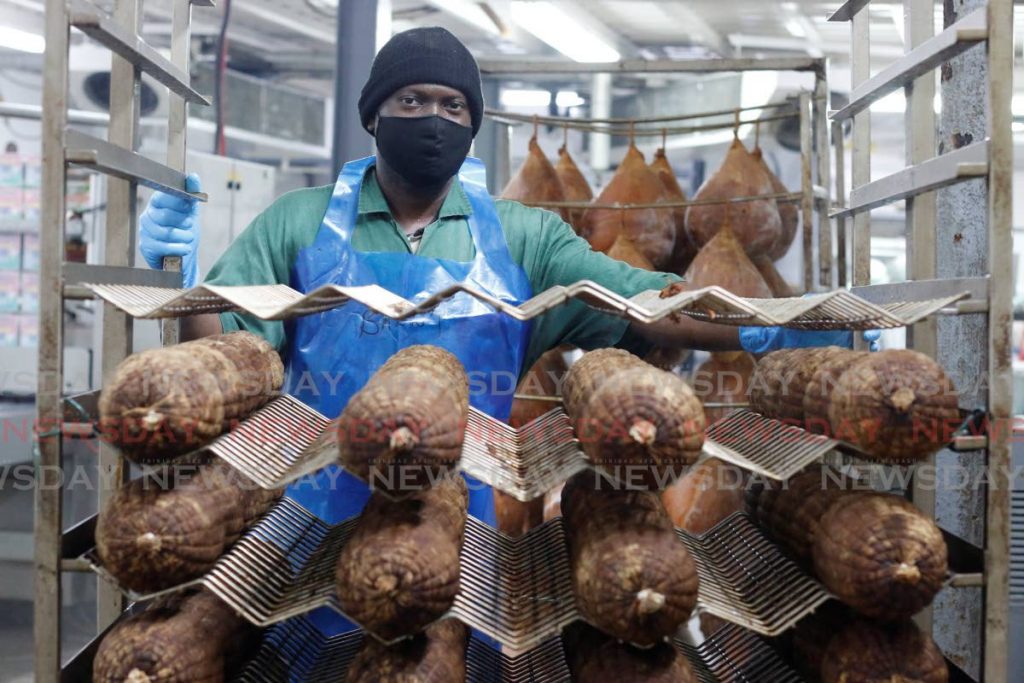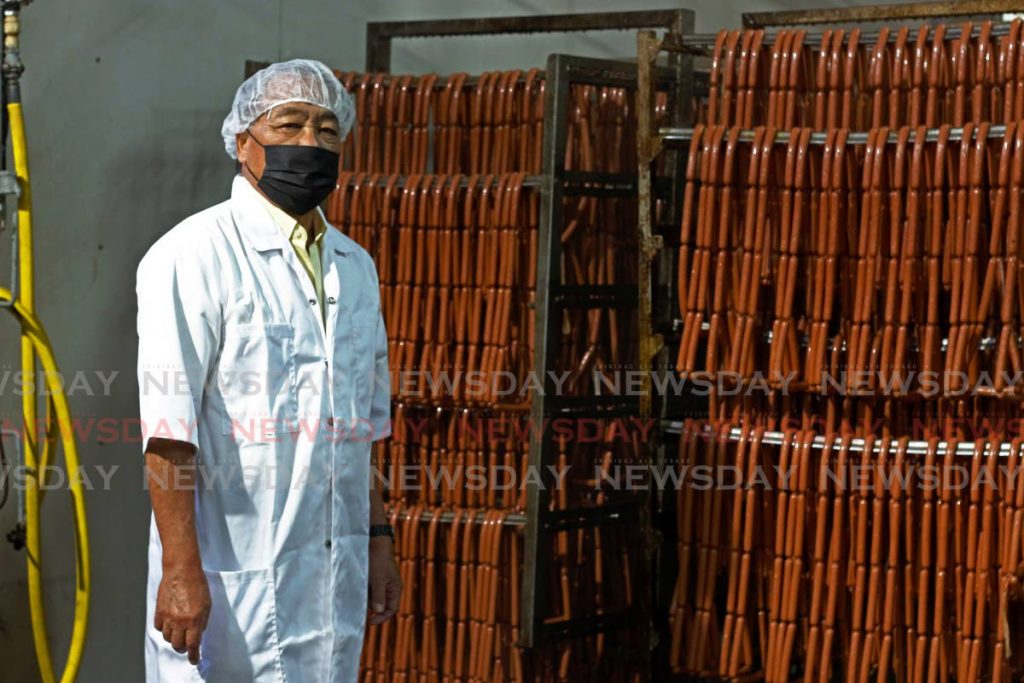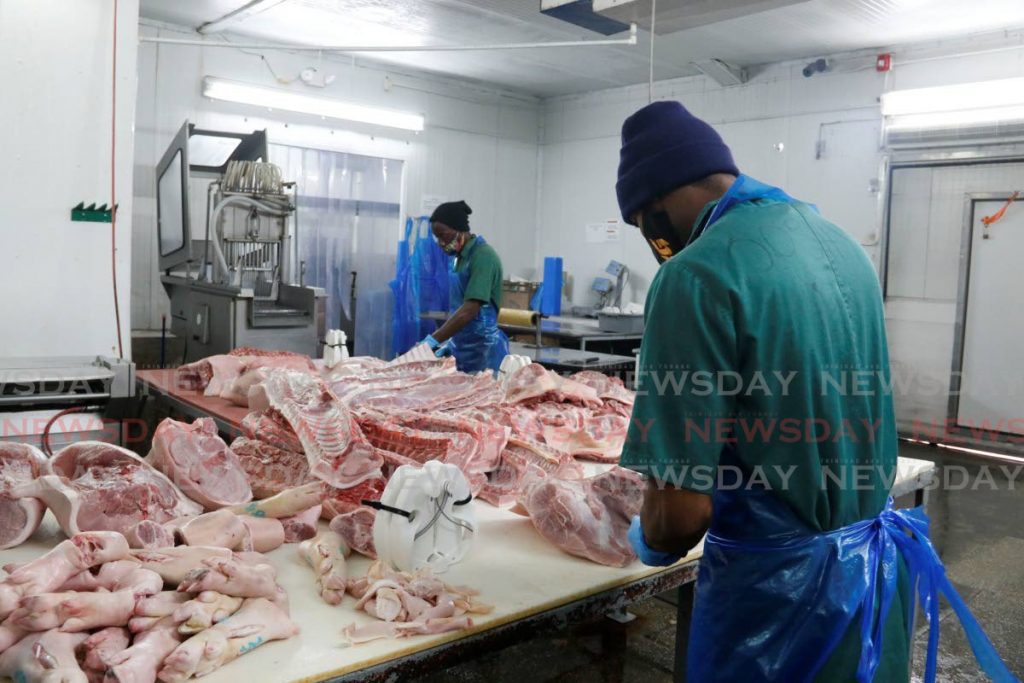Erin Farms keeps ham on Christmas menus

With Christmas right around the corner, preparations this year may not be as festive as in the past, but for many it would be incomplete without a good ham on the table.
Covid19 has put a damper on the celebrations with Government implementing various restrictions to stymie the spread of the virus. But the limitations on gatherings and parties will mean a more intimate Christmas for families, with good food, of course.
Ham can be considered a must-have dish. But have you ever wondered about the process of getting that leg of ham or picnic ham on your table?
A household name in Christmas hams is Erin Farms: the brand that began more than 50 years ago, when founder Rupert Leong Poi started a pig farm in the village it is named after in south Trinidad. The farm has since grown to include the meat processing operation, Erin Meat Packers Ltd.
As a family-run enterprise, Erin Farms Ltd has been rearing, curing, and processing pigs which many households consume locally and regionally.

Rupert Leong Poi had been at its helm until his passing eight years ago when the enterprise was handed over to his children: his sons, Ronald Leong Poi who oversees the operations of Erin Meat Packers, Ian Leong Poi, the manager of Erin Farms, and his daughters are in charge of the marketing department.
The companies share a ten-acre site at Farm Road, St Frances Village in Erin. Year-round, Erin Farms rears pigs and produces hams and pork products such as bacon. It also has poultry, beef and turkey products, but the meat is outsourced from international suppliers for their sausage products and hams.
Erin Meat Packers is at the front of the compound. Its production line, packaging and distribution departments have most of its employees coming from Erin, Palo Seco, Siparia and environs. According to Ronald nearly 160 to 180 people work for the companies.
Further to the back of the compound, the pig stalls can be found. They have been sectioned off by age from new-borns to weeks’ old piglets to months’ old piglets and those ready for the slaughterhouse.
“The farm has been in existence for about 55 to 60 years. My father started it when he was a proprietor at his supermarket in Palo Seco. In those days, the only pork sold came from Australia and by the time the pork got to him, it was so freezer burnt that the quality of the pork was not good," said Ronald.
“He decided to raise a few pigs at the back of his father’s place in Erin and there he slaughtered whatever he had and sold it at the supermarket. The excess meat was sold at other supermarkets in the area and soon the demand grew for the local pigs.”

Ronald said Erin Farms products cater for the local taste buds.
“Most of the spices that we use in our products are imported and pre-blended spices. But we do not just use that, we add other things to make it more palatable for our taste. I believe this is the reason why our products are so greatly accepted. We always try to improve, and we are in the process of redesigning our packaging.
“Our certification has allowed us to export to other Caricom countries and even though we practice hazard analysis and critical control points (HACCP) procedures and are certified by an organisation from Holland, we cannot be HACCP certified to export to Latin American countries because we house live animals on the same compound,” he said. (HACCP is a world-wide management system on food safety that addresses from raw materials to manufacturing, distribution and consumption.)
The ham processes
While Erin Farms has been rearing the pigs for its hams and other products, this year marks 26 years since Erin Meat Packers embarked on further processing, allowing a year-round production.
Ronald's eldest son Kurt, the operations manager at the farm, took Business Day on a tour of the production plant.
When the pigs are nearly five-and-half to six months they are taken to the slaughterhouse. From there they are then taken to the production facility.
The ham process includes rearing of the pigs, slaughter, then cleaned, pumped, vacuumed-massaged, wrapped, smoked, and packaged stages.
“The pieces of meat are selected, then it would be placed in the massage tumbler to cure, then it is moved to the stuffer, then it is smoked for about eight hours, it is then cooled, packaged frozen for about two days before it is distributed to the groceries," said Kurt.
“With the new injector and massage machinery the brine is injected into the meat and then moved to the massage room for a few hours. This actually speeds up the processing time from a few days to a few hours and makes the meat more tender.”
Usually, he said, 2,000 kilogrammes of ham are produced per day but coming closer to Christmas the output is ramped up.

Surviving the covid19 times
As for all industries, the ham business has seen a decline because of covid19, despite Christmas being the busiest time of the year for production.
Ronald said sales from restaurants fell and with in-house dining restrictions sales were diverted in other areas.
“People have to eat regardless of the restrictions and with people not going to the restaurants as they used to and while they still buying their chicken ad chips, those who are at home prefer to buy a pack of hotdogs and buns," he said.
“Sales especially from the restaurants have been down because a lot of them buy pork from us, but we have been able to survive. And luckily, we were also able to hire a few more people.
“For this year, we estimate 110,000 kilos of picnic hams which retails for about $130. Supermarkets are requesting hams of the same size and weight so that the price remains steady. We estimate less than 40,000 kilos of the leg ham to be sold. This is more expensive than the picnic ham and retails for between $250 and $300.”
Ronald was hopeful that sales will pick up for the season and has also made available again its signature black forest turkey harm.
“We are hoping to sell out what we have but we know that the buying power of the consumers was not as strong as it used to be.
“I wanted to introduce the black forest concept but not with ham, so we used the turkey meat instead. Based on demand it is usually available at Christmas time and has been on the local market for about eight years.”
He added that the company works closely with the Ministry of Agriculture, Land and Fisheries and the University of the West Indies (UWI) as a form of quality control.

“The spices and raw materials we import are duty free under the SS24 licence. We do not pay any duties on raw materials including meats, packaging equipment and plant equipment. We have to pay value added tax, of course.
“We also work with the UWI veterinary department to get samples tested to make sure that the bacterial levels are controlled. We also do our own rapid testing (on the meat).”
Pandemic or not, Erin Farms has plans to maintain their competitive edge. In 2021, they will revisit and introduce their line of vegetarian foods.

Comments
"Erin Farms keeps ham on Christmas menus"